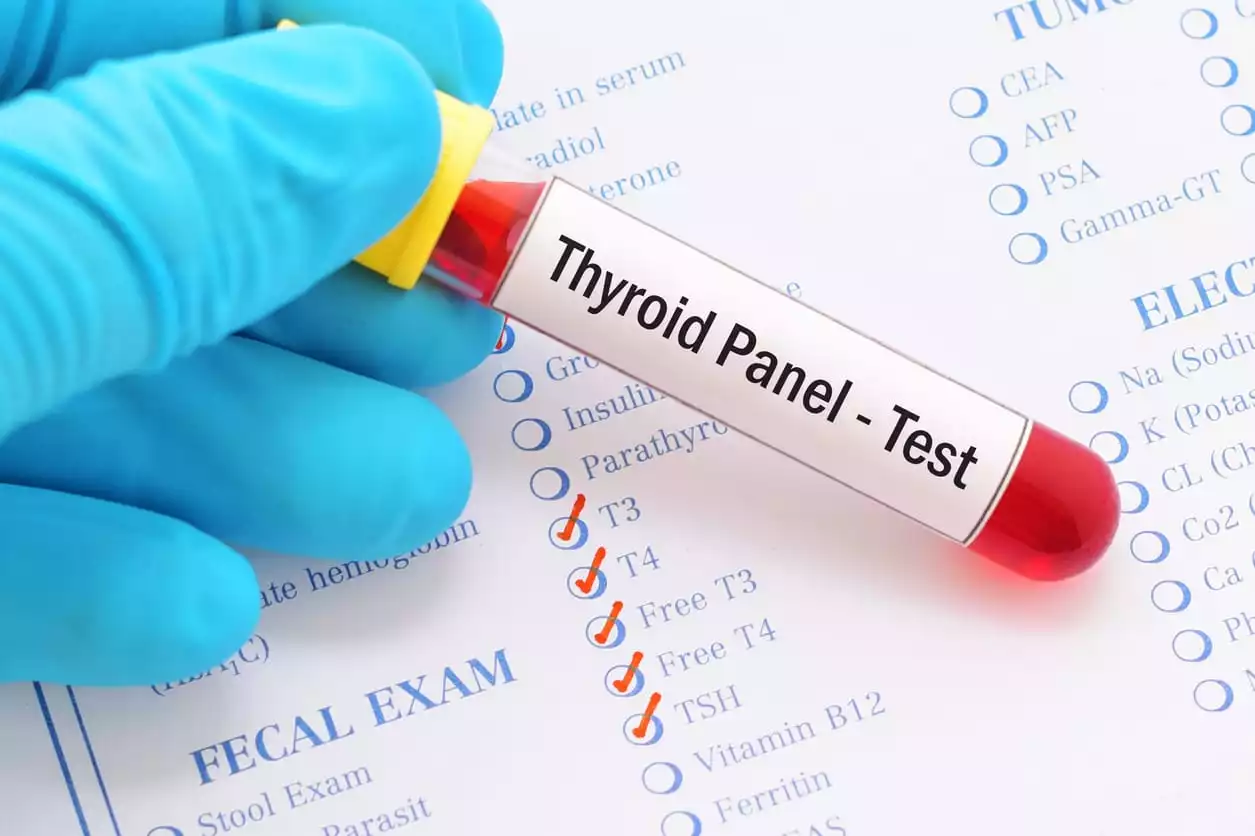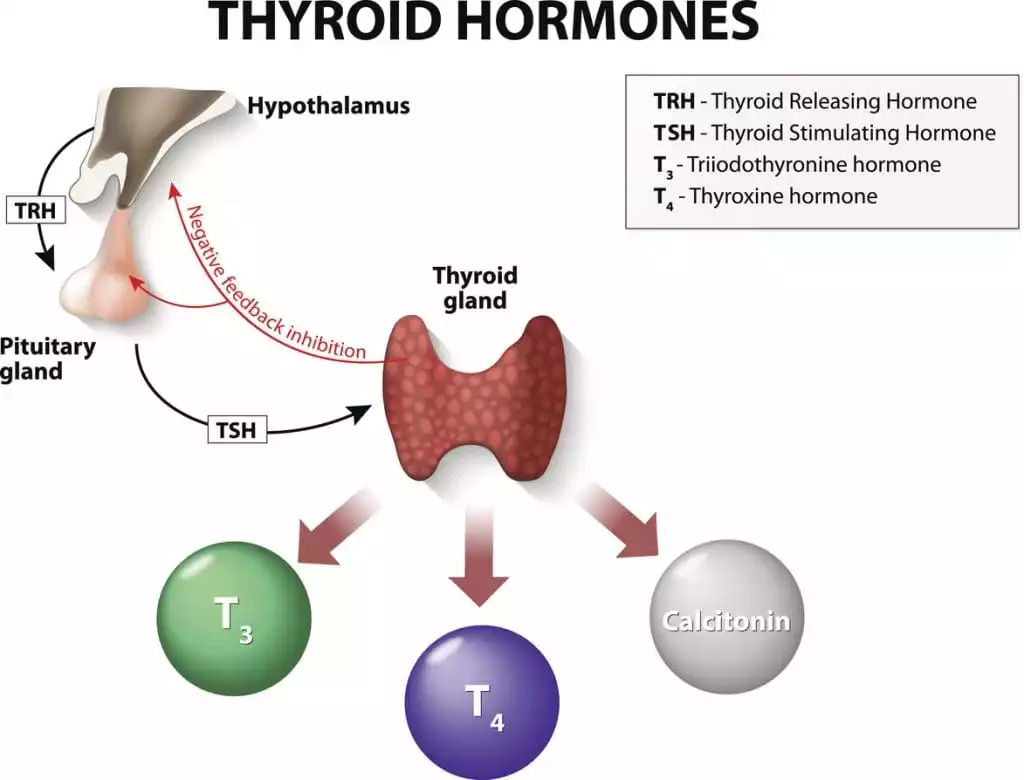
Thyroid issues are extremely common and affect nearly 12 million Americans. Here are 5 common thyroid treatment options to consider.
Let’s do a neck check.
Place your finger on your chin. Gently slide it down the midline of your neck until you feel something hard. This is thyroid cartilage that leads to your Adam’s apple. Keep sliding your finger down until you feel more cartlidge that wraps around the windpipe. Slide down again two digits, and you will feel the Thyroid isthmus, which connects the two lobes of the thyroid. Use your finger to feel for lumps or abnormalities.
Or, the next time you take a sip of water, do it in front of a mirror. Tilt your head slightly back, so your nose is pointing towards the ceiling. As you drink the water, watch your neck and see if any noticeable lumps or bumps appear as you swallow.
Doing these simple tricks at home does not guarantee you have or do not have a Thyroid disorder, but they can help you recognize when to seek medical treatment. Even if you don’t see an abnormality but are having symptoms associated with Thyroid problems, consult with your doctor. There are specific tests that can provide answers.
You don’t want to be one of the millions of people who go undiagnosed each year.
The American Thyroid Association reports 12 million people struggle with Thyroid problems, with 60 percent being undiagnosed.
Statistics like this can be alarming since we know the thyroid affects every cell, tissue, and organ in your body. The thyroid may be small in size, but it has a lot of power. It releases necessary hormones into your system.
This may be why there are so many symptoms associated with a malfunctioning Thyroid.
Symptoms of Thyroid Disorders
Many of the symptoms can be confused with other illnesses, making it even more important to consult with a professional.
Patients often report symptoms such as depression, anxiety, and irritability. Also, muscle weakness, weight changes, digestive issues, dry skin, and sleep disturbances occur. If you have sensitivities to heat and cold, it could be due to imbalanced thyroid hormones.
The list of symptoms can be lengthy and vary from person to person; another reason speaking with a professional is essential.
If you want to learn more about the thyroid before making an appointment with your doctor, visit your pharmacist. Your pharmacist is an expert in symptoms related to all disorders, as well as treatment options.
Obtaining education from your pharmacist can help you decide how to seek help from a physician and choose between treatment options, some of which are listed below.
Treatment Option: Medication
Most family physicians will order lab work to check your Thyroid hormone levels. If your levels fall out of normal range, you will likely be prescribed medication to regulate Thyroid hormones. Doctors typically start your medication, which is synthetic, at the lowest dose, and retest your hormone levels after a few months. It’s crucial to analyze your test results.
You need to know if you fall on the high or low end of the thyroid spectrum or in the middle. If your levels are low but still within the normal range, your doctor may not consider treatment. But being at the low end or the high end can signal problems to come.
For example, if the normal range is between 4 and 9. Your test results show you are a five, and you have multiple common symptoms of Thyroid disorder. Your doctor may not think you need treatment. However, being so close to the abnormal means, at a minimum, you should be making changes that support a healthy Thyroid, like finding ways to treat or replace your hormones.
Treatment Option: Bio-Identical Hormone Replacement Therapy
Bio-identical hormone replacement therapy (BHRT) is used to replace your imbalanced hormones with human-made but chemically identical to the hormones your body naturally produces.
Something to keep in mind with this treatment is that there are two types of BHRT. One is the medication made by drug companies. A second type is compounded by your pharmacist, locally, and using only ingredients ordered by your doctor.
Choosing compounded BHRT means your medication is created specifically for you, meeting only your needs. Your pharmacist can take allergies and potential interactions into consideration when making your BHRT. Your pharmacist can even make your medicine in forms like creams, gels, or injections based on your preferences.
For many, compounding is found to be safer and more effective.
Treatment: Diet Protocols
What you eat can affect your thyroid. There have been many reports on the importance of probiotics to reduce inflammation in the gut.
Your local pharmacy sells top brand probiotics. Reducing the amount of sugar in your diet can also reduce inflammation that can trigger hormone imbalances. This is an excellent time to ask your doctor for food sensitivity testing so you can know exactly which foods to avoid.
Treatment: Supplements
Vitamins and Minerals can help regulate Thyroid hormones. These can be used in conjunction with prescribed medication, giving them a boost. Vitamin B12 is one vitamin noted for helping thyroid production. It may also help with symptoms of feeling tired or weak.
Zinc and Selenium have been noted to help in metabolizing and synthesizing Thyroid hormones from inactive to active. Also, iodine, magnesium, and vitamins C and D can improve symptoms.
Because there are so many options, work with your pharmacist to determine which vitamins and minerals will be best for you.
Treatment: Herbs
Studies have shown several herbs positively influence thyroid function. Some of these include ashwagandha, which is also great support for your adrenal glands. It can ease brain fog and stress. Bugleweed calms nerves, reducing tension and stress, allowing your thyroid to function better.
Another metabolism booster is guggul gum, used in auyervedic medicine to reduce inflammation. To lower blood pressure and regulate blood sugars, many are turning to forskolin. More recently, it has been connected to weight loss.
Don’t wait to learn more. Your pharmacist is accessible, knowledgeable, and eager to help you understand common thyroid medications and treatment options.

 info@burtsrx.com
info@burtsrx.com

